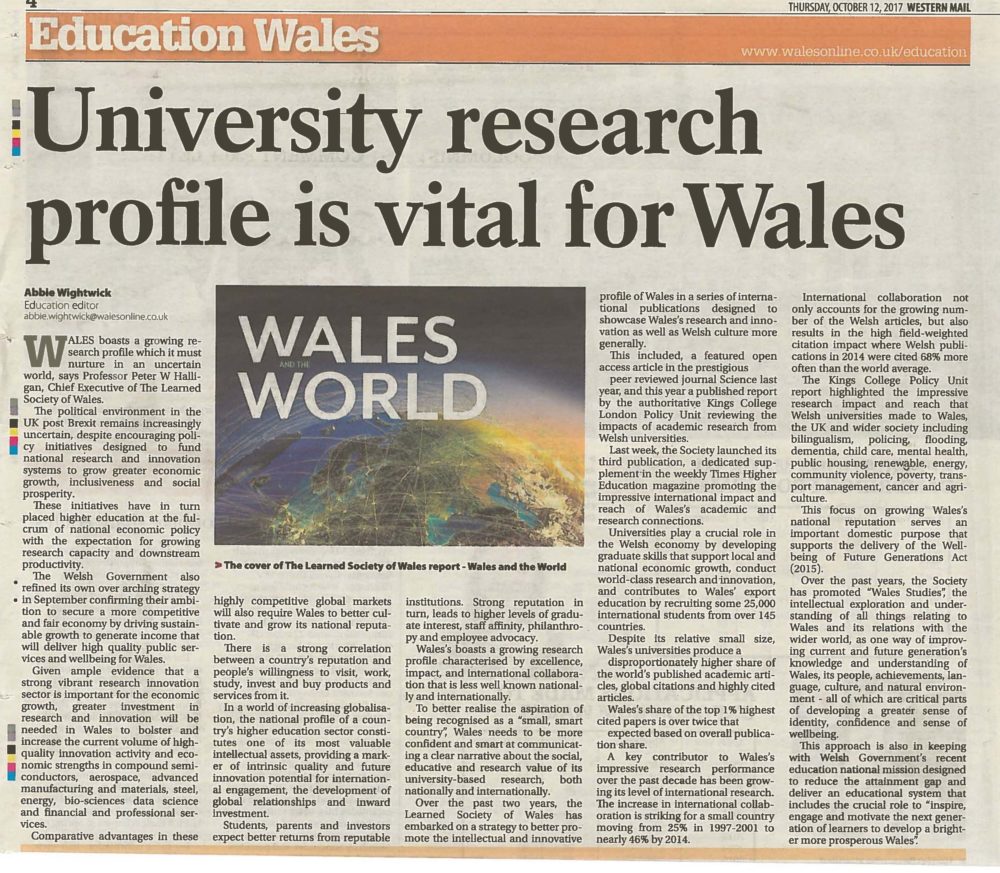Making the Case for Wales

Marking the recent launch of the Society’s ‘Wales in the World’ report distributed by the Times Higher Education, Prof Peter Halligan wrote the following column in the Western Mail on Oct 12, 2017
“The political environment in the UK post Brexit remains increasingly uncertain, despite encouraging policy initiatives designed to fund national research and innovation systems to grow greater economic growth, inclusiveness and social prosperity. These initiatives have in turn placed higher education at the fulcrum of national economic policy with the expectation for growing research capacity and downstream productivity.
The Welsh Government confirmed its own overarching strategy in September this year confirming their ambition to secure a more competitive and fair economy by driving sustainable growth to generate income that will deliver high quality public services and wellbeing for Wales. Given ample evidence that a strong vibrant research innovation sector is important for the economic growth, greater investment in research and innovation will be needed in Wales to bolster and increase the current volume of high-quality innovation activity and economic strengths in compound semi-conductors, aerospace, advanced manufacturing and materials, steel, energy, bio-sciences data science and financial and professional services.
Comparative advantages in these highly competitive global markets will also require Wales to better cultivate and grow its national reputation. There is a strong correlation between a country’s reputation and people’s willingness to visit, work, study, invest and buy products and services from it.
In a world of increasing globalization, the national profile of a country’s higher education sector constitutes one of its most valuable intellectual assets, providing a marker of intrinsic quality and future innovation potential for international engagement, the development of global relationships and inward investment. Students, parents and investors expect better returns from reputable institutions. Strong reputation, in turn, leads to higher levels of graduate interest, staff affinity, philanthropy and employee advocacy.
Wales boasts a growing research profile characterised by excellence, impact, and international collaboration that is less well known nationally and internationally. To better realise the aspiration of being recognised as a “small, smart country”, Wales needs to be more confident and smart at communicating a clear narrative about the social, educative and research value of its university-based research, both nationally and internationally.
Over the past two years, the Learned Society of Wales has embarked on a strategy to better promote the intellectual and innovative profile of Wales in a series of international publications designed to showcase Wales’s research and innovation as well as Welsh culture more generally. This included, a featured open-access article in the prestigious peer-reviewed journal Science last year, and this year a published report by the authoritative Kings College London Policy Unit reviewing the impacts of academic research from Welsh universities. Last week, the Society launched its third publication, a dedicated supplement in the weekly Times Higher Education magazine promoting the impressive international impact and reach of Wales’s academic and research connections.
Universities play a crucial role in the Welsh economy by developing graduate skills that support local and national economic growth, conduct world-class research and innovation, and contributes to Wales export education by recruiting some 25,000 international students from over 145 countries. Despite its relatively small size, Wales’s universities produce a disproportionately higher share of the world’s published academic articles, global citations and highly cited articles. Wales’s share of the top 1% highest cited papers is over twice that expected based on overall publication share.
A key contributor to Wales’s impressive research performance over the past decade has been growing its level of international research. The increase in international collaboration is striking for a small country moving from 25% in 1997-2001 to nearly 46% by 2014. International collaboration not only accounts for the growing number of the Welsh articles, but also results in the high field-weighted citation impact where Welsh publications in 2014 were cited 68% more often than the world average.
The Kings College Policy Unit report highlighted the impressive research impact and reach that Welsh universities made to Wales, the UK and wider society including bilingualism, policing, flooding, dementia, childcare, mental health, public housing, renewable, energy, community violence, poverty, transport management, cancer and agriculture.
This focus on growing Wales’s national reputation serves an important domestic purpose that supports the delivery of the Well-being of Future Generations Act (2015). Over the past years, the Society’s has promoted “Wales Studies”, the intellectual exploration and understanding of all things relating to Wales and its relations with the wider world, as one way of improving current and future generation’s knowledge and understanding of Wales, its people, achievements, language, culture, and natural environment – all of which are critical parts of developing a greater sense of identity, confidence and sense of wellbeing.
This approach is also in keeping with Welsh Governments recent education national mission designed to reduce the attainment gap and deliver an educational system that includes the crucial role to “inspire, engage and motivate the next generation of learners to develop a brighter more prosperous Wales”.